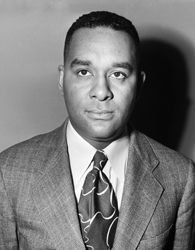Richard Wright is known for landmark books like “Native Son” and “Black Boy.”
Richard Wright’s Early Days
Richard Wright was born near Natchez, Mississippi, on September 4, 1908, to Nathaniel Wright, a sharecropper, and Ella Wilson Wright, a schoolteacher who later took up farm work. Wright and his family moved around a great deal in his youth, and his father left the family when Wright was six. The family struggled with poverty, and his mother at one point was quite ill, but recovered.
He loved reading as a child, and in 1924, a local newspaper published his story “The Voodoo of Hell’s Half Acre.”
Sources in this Story
- Modern American Poetry (American National Biography Online): Richard Wright’s Life
- Mississippi Writers Page: Richard Wright
- John Simon Guggenheim Foundation: Richard Wright
- The Guardian: The Island affair
- NPR: ‘Father’s Law’ a Reflection of Wright’s Masterpieces
Wright’s Novels
Frustrated with life in the South, Wright moved to Chicago in 1927. He worked at a post office and as a street sweeper, and also continued to write and publish short stories in the 1930s, including a collection called “Uncle Tom’s Children.”
During this period, Wright also began writing for communist publications, joining a Chicago intellectual branch of the Communist Party called the John Reed Club. After he moved to New York in 1937, he helped found the publication New Challenge and helped edit the Daily Worker and Left Front. He eventually split from the Communist Party over philosophical disagreements, chronicling his experiences at length in the second volume of his autobiography, “American Hunger.”
Wright was awarded a Guggenheim Fellowship the following year, allowing him to work on his most famous work, “Native Son,” which was published in 1940. The novel forced readers to confront the status of blacks, particularly in the South, and forced readers to do the same. The book was the first best-selling novel by an African-American writer.
The Man and His Work
The Rest of the Story
In the racist climate of the times, his wealth and success didn’t mean much. In 1947, he forsook the United States for the more liberal arena of Paris, home to so many other expatriate writers and African-American artists. He met French existentialists, including Jean-Paul Sartre, who is thought to have greatly influenced Wright’s novel “The Outsider” (1953).
Wright never returned to America. His former membership in the Communist Party attracted the scrutiny of the CIA and FBI and, during the era of McCarthyism in the 1950s, he was blacklisted by the Hollywood’s Directors’ Guild. He spent much of the rest of his life traveling. He visited Africa and wrote important nonfiction about emerging African nations, and lectured on literature and other topics.
After contracting amoebic dysentery during a trip to Africa, Wright died of a heart attack on February 28, 1960. Cremated along with a copy of the first volume of his autobiography, “Black Boy,” his remains were buried in Paris’s famed Père-Lachaise cemetery.
His wife Ellen, a Jewish woman of Polish descent, helped to publish more of his work, including the short story collection “Eight Men” (1961) and a Joycean novel, “Lawd Today” (1963). His final novel, “Island of Hallucinations” has never been published.
In 1980, his elder daughter Julia Wright published the unfinished novel “A Father’s Law,” about a police chief who believes his son is a murderer.
Today, books like “Black Boy” and “Native Son” are permanent fixtures of high school and college reading lists, along with works of the African-American authors for whom Wright paved a trail, such as Ralph Ellison (“Invisible Man”) and James Baldwin (“Go Tell It on the Mountain”).
This article was originally written by Liz Colville; it was updated September 1, 2017.











